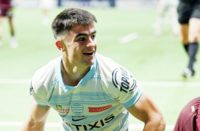 Nick Mallett knows a thing or two about being in charge of “the most dominant team in the history of the world”. That, of course, is how New Zealand refer to themselves behind closed doors in their sessions with head coach Steve Hansen. It is a self-aggrandisement which smacks of a team looking for new motivational tools after failing to match Mallett's world record of 17 consecutive Test wins, which he achieved as coach of South Africa from 1997 to 1998.
Nick Mallett knows a thing or two about being in charge of “the most dominant team in the history of the world”. That, of course, is how New Zealand refer to themselves behind closed doors in their sessions with head coach Steve Hansen. It is a self-aggrandisement which smacks of a team looking for new motivational tools after failing to match Mallett's world record of 17 consecutive Test wins, which he achieved as coach of South Africa from 1997 to 1998.
Mallett's Springboks are the only elite rugby nation in the pro era to reach that landmark (although the amateur era All Blacks established a 17 match record from 1965 to 1969).
New Zealand's hopes of surpassing that were dashed last season when, after 16 straight wins, they drew 18-18 with Australia in Brisbane. Then, despite winning the first three games on their 2012 autumn tour, they came a cropper at Twickenham in their last match of the season – and had to start all over again.
Nearly-but-not quite record attempts are not the sole preserve of New Zealand. If the 2002-2003 England world champion coach Clive Woodward had not put out a second team against France in a 2003 World Cup warm-up match in Marseilles, with a 17-16 loss ending a 15-match winning run, history tells us that, with seven further wins in the 2003 tournament and two more in the 2004 Six Nations, they might have extended the record to 25 wins.
While acknowledging that without the two glitches against Australia and England, Hansen's team could have had a winning run of 30-plus dimensions by now, Mallett – who is working as a commentator for South Africa's SuperSport television network – says New Zealand can be caught.
Mallett, who lost out to Stuart Lancaster for the England head coach job two years ago, says that with England 2015 around the corner the chasing peleton is gradually reeling-in the All Blacks, with the Springboks in the vanguard. He argues also that New Zealand have benefitted recently from a lack of truly competitive opponents.
“The gap is narrowing. It is definitely a lot closer than last year, and even though South Africa lost their two games against New Zealand they put up very good performances. They are the only side at the moment that can threaten that New Zealand number one slot – and although that's been about how good the All Blacks have been, it's also about how weak the other teams have been.”

He adds: “South Africa have been making strides under Heyneke Meyer, based on playing to our traditional virtues of a big strong pack, aggressive defence, and an accurate kicking game.
In tight games South Africa always fall back on the set piece, the driving maul, big ball-carriers up front like Eben Etzebeth, and having a good decision-makers at No.9 like Fourie Du Preez.”
Nevertheless, Mallett says that seeing the 2015 World Cup as a two-horse race between New Zealand and South Africa is also wide of the mark, and that how the Springboks do against the Scots at Murrayfield today, and next weekend against France in Paris, will be telling.
“South Africa have not moved too far away from the rest of the pack. We are still closer to France, England, and Wales than we are to New Zealand. The Springboks are getting back to that level with New Zealand, but in order to close the gap we have to beat Scotland by 20 points at least, and then go on to beat France. If we do that, we deserve to be second in the world.
“You have to accept that New Zealand have been very dominant for two seasons, winning all their games apart from the Wallaby draw, and then at Twickenham when they were beaten by a very good England performance.”
However, he sounds a cautionary note over teams, and coaches, getting ahead of themselves before the 2015 World Cup.
“Two years is a very long time in sport. In the 2011 World Cup the Springboks were two years past their best after peaking against the Lions in 2009, so a lot will depend on how Heyneke (Meyer) freshens up the side with young players. There is talk of him going back to veterans like Bakkies Botha, but he mustn't do that – over the next two years you need to give Etzebeth and promising young guys like Pieter-Steph Du Toit game time.”
Mallett stresses that it is imperative for South Africa's self-belief that they win their home games against New Zealand before the 2015 tournament.
“Meyer has done very well in his first two years, in particular beating Australia home and away. The only deficit is zero out of four against New Zealand. South Africa have thrown everything at the All Blacks, and had it thrown back at them. We have to beat them at home at least twice before the 2015 tournament so that we know that on a neutral venue we have a chance.”

Mallett believes that the win over Wales showed that the Springboks still have too many rough edges, and, conversely, that the Welsh are serious contenders whose main drawback is a lack of reserve strength.
“South Africa had a fantastic start against Wales, but then the old Springbok bugbears like giving away penalties and getting yellow cards began to surface. We need to get the indiscipline shown by players like Bismarck Du Plessis and Franois Louw out of our system. Legitimate aggression in the tackle is fine, but we need to steer clear of off-the-ball incidents.”
He continues, “We also have to recognise that the referee's call on the Fourie Du Preez try made a big difference. At 17-15 it didn't matter how much physically superior South Africa were, had a penalty been awarded to Wales for Jaque Fourie being offside, it could have been different. Leigh Halfpenny is a bloody good kicker, and instead of 24-15 to South Africa it could have been 18-17 to Wales. South Africa have to learn not to let teams back in.”
Mallett believes strength in depth is what separates them as World Cup contenders: “There is a lot more strength in depth in the South African side than there is with Wales. Where the Springboks lose Pierre Spies they bring in Duane Vermeulen – a very good, strong No.8 who does mountains of work – and when Botha goes they bring in Etzebeth, and there is no obvious difference. However, Wales cannot replace Jamie Roberts or Jonathan Davies that easily, and where their forwards might be physically fit, you don't see any of them having the carrying ability of the Springboks, who have five to hand in Willem Alberts, Franois Louw, Vermeulen, Bismarck Du Plessis, Tendai Mtawarira, and Etzebeth.”
He suggests also that the ‘Warrenball' tactical approach used by Wales and the 2013 Lions under Warren Gatland's tutelage depends on their big backs staying fit.
“Wales use their big wings, George North and Alex Cuthbert, as carriers alongside Roberts, and when you have men of that size and power in the backs you don't need forward runners that much. They hit the fly-half channel with those guys so hard, and generate such momentum, that they are difficult to stop. That's why the Welsh have really missed Roberts and Cuthbert this autumn, and why, if they had all their players, they would be hard to beat.”
Mallett says he has no problems with Meyer picking overseas-based players – whether in Europe or Japan – to ensure that the Springboks are tapping into all their resources.
“The job of a national coach is to pick his best team to win. It's a question of being pragmatic, and with five Super franchises to feed, and the question of our exchange rate, it is very difficult to pay our players the salaries that they can get overseas. That's why players like Du Preez, Fourie, Louw and JP Pietersen have left – and you cannot blame them for looking after their own financial security and getting paid double what they do at home.”
As for potential Springbok problem positions, such as fly-half where Morne Steyn still has his detractors, and tight-head prop, Mallett believes there is enough cover.
“Morne is playing well, and there is also young Johan Goosen, who plays for the Free State. Goosen has been injured, but if he can get through a full season he'll come into the frame. Also Pat Lambie has been judged harshly behind a Sharks pack that did not go especially well in the Super 15, but with a pack giving him go-forward he is a talented fly-half, as he showed in the semi-final and final of the Currie Cup.”
He adds, “At tight-head Frans Malherbe has got what it takes, but we definitely need another one to back up Jannie Du Plessis to be alright for the World Cup.”
Mallett says that South Africa are well placed in their preparations to get their hands on the World Cup for a third time, and that having so many 2007 winners in the frame has a lot to do with it.
“By 2015 they should be in good shape, with the experience of World Cup-winning backs like Franois Steyn, Bryan Habana, Jaque Fourie and JP Pietersen still available, and good young players like Jan Serfontein being introduced. Scrum-half might be more of a problem if Fourie Du Preez doesn't make it…but in the forwards there is Spies to come back, and they are not short of power carriers. I really like the back row combination of Alberts, Vermeulen and Louw. Add to that Etzebeth and front row carriers of the quality of Bismarck (Du Plessis) and Tendai (Mtawarira). That's a really decent side.”
New Zealand may be making all the running now, but their old rivals are stalking them. The South Africans do so in the knowledge that they are in the same half of the 2015 tournament draw as New Zealand – and if a former Springbok coach of Mallett's stature thinks they are gaining ground then, irrespective of their peerless ledger this autumn, Hansen's team will be looking over their shoulder.


























